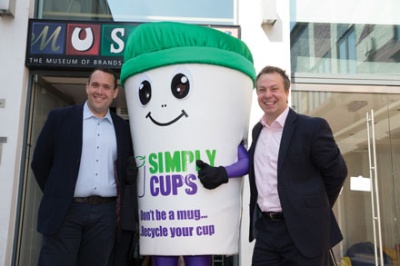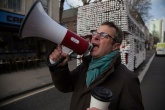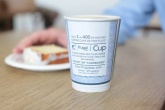Why it's not so simple to recycle paper cups
Despite a popular misconception to the contrary, paper cups go largely unrecycled in the UK. Will Simpson learns about a new scheme that’s aiming, quite simply, to change all that.

This feature was originally published in Resource 82 in Autumn 2015
Their volume is immense. On our high streets, vast quantities exit the doors of coffee shops every day, but the humble paper cup has long posed a problem to the recycling industry. For one thing, the plastic coating that gives the cup its rigidity is difficult to separate from the paper. Then there is the misinformation.
“I think there was a perception that paper cups were already being recycled”, says Peter Goodwin, Director of Closed Loop Environmental Solutions. Closed Loop made its mark by pushing forward recycling for plastic bottles, but according to Goodwin had had its eye on cups for some time. “People were always asking us, ‘But what about paper cups?’ It took us a while to establish that there was no solution in the UK, and that fundamentally the majority of cups were still being sent to landfill or incineration.”
So Closed Loop, in partnership with the Slough- based waste management company Simply Waste, came up with a plan to ‘disrupt’ the marketplace in the same way it had done with plastic bottles. “What was apparent was that there was a bit of a stand off”, says Goodwin. “The manufacturers were saying, ‘Our paper cups can be recycled’, and the waste infrastructure providers were saying, ‘But there’s no value in that material. Why are we going to invest in facilities to get the paper cups out if we can’t realise any value from them?’”
 This article was taken from Issue 82
This article was taken from Issue 82The breakthrough came in 2012 with the arrival of Cumbrian paper manufacturer James Cropper to provide the market for the extracted paper material and a new polyethylene separation process. “We invested £5 million into it”, says Manufacturing Technology Manager Steve Oxley. He explains the process: “The material goes into a tank of hot water with a high pH. Then there is a huge agitator – a pulper – which swirls it round and the abrasion that is in there strips the plastic off. Then there are a whole series of screens and cleaners that separate them.” The plastic is sold off-site and eventually recycled, whilst Cropper uses the paper to produce high- quality coloured paper for whiskey cartons, perfume cartons, hardback book covers and graphical papers. At present, the scheme is operating only in Central London. Customers – usually large workplaces – pay a fee to join the scheme and set up weekly, fortnightly or monthly collections, depending on their size. Simply Waste collects and returns the cups to its plant in Middlesex, where they are debagged, graded and then baled before a significantly sized load, say 10 tonnes, goes off to James Cropper for reprocessing.
It’s still early days for Simply Cups. In its first year, the scheme saved over 1 million cups from going to landfill. Impressive, but still a drop in the ocean of 2.5 billion that there are in the UK marketplace. Oxley is confident that that figure will only rise. “We are starting to make it practical. I expect in six months’ time to have probably increased the amount we are recycling by at least a factor of 10, if not 50.”
Closed Loop, which manages the membership and promotion of the scheme, is certain that there is potential to expand Simply Cups beyond the capital. “I’d say the model is pretty scalable nationwide”, suggests Goodwin. “There is also potential to widen it into a generic cup service. There are a number of other materials used in the hospitality and catering industries that are recyclable but are not currently being recycled – for example polypropylene and polystyrene cups.
“But in the short term, the challenge for us is to convert the interest that there is in this into volume. We’ve already come a long way by managing to get people from across the supply chain talking to each other. Now we just need to get the volume of cups to take it to the next stage.”









